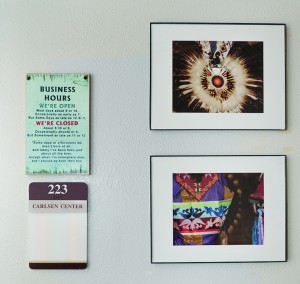by J.T. Buchheit
News Editor
The Center for American Indian Studies is the college’s place for all things Native American. One of its primary purposes is to provide aid to Native American students in any obstacles they may face while enrolled at the college.
“A lot of [the difficulties] are financial,” said Sean Daley, director of the center and professor of anthropology. “… A lot of American Indians come from poor communities, communities where they may be the first person in their family to go to college, so a lot of them have never left their reservations or home communities before, so it’s a big step to be the first person in your family or community to go off to college. … Getting the tuition money and finding a place to live can be hard because money’s an issue on reservations.”
The center, established in 2010, can also be used by students and faculty members who are interested in getting more information about Native American culture or are teaching a lesson dealing with Native Americans. One Native American student, Aysia Gusman, decided to participate in the center due to her desire to learn more about her native culture.
“I’ve always been interested in American Indian studies,” said Gusman. “I took Sean’s class [about Native Americans] a few years ago, and he knew I wanted to study American Indian studies. … He said he had a job opening, so I thought it would be a good place to start to figure out if I wanted to pursue this as a career.”
In addition to providing assistance and education to students and professors, the center also holds two powwows every year.
“The biggest activity we do around here is the big powwow over at the Gym the first weekend of every May,” said Daley. “This will be our 10th year coming up. We had 2,000 people here last year for the weekend. We do a smaller powwow in November. That one’s usually out in Lawrence or one of the American Indian reservations here in Kansas. Next month it will be on the Potawatomi reservation.”
Although the powwows are the most notable activities, the center also hosts other events that take place at the college that are open for anyone to participate in.
“We do all kinds of films and film screenings,” Daley said. “Next month we’re having a small American Indian dance performance in the Carlsen Center. We coordinate activities for the students and sometimes for the faculty and staff.”
The center’s reach expands beyond the college, however; it’s also devoted to helping Native Americans throughout the U.S.
“There are several projects that we have going on,” said Gusman. “One thing been working on is mental health and suicide prevention. We’re working on ‘what does it mean to be Native American?’ to people all over the country. We have a program called ‘Green Nation,’ which is an environmental program where we try to evaluate people’s homes to find what we need to work on in the Native community to improve their lives.”
Gusman believes the organization has had a major effect on her and her contributions to society as a whole.

“It’s really impactful in everything we do,” she said. “All of these studies are impacting people on a daily basis, so I think it’s really important that we’re focusing on those issues.”
For more information regarding the Center for American Indian Studies, visit CC 223 or their website.





















